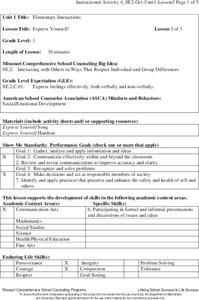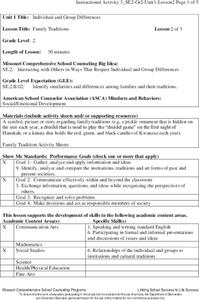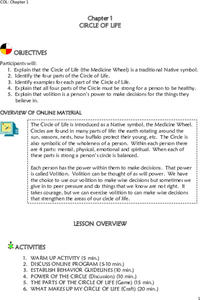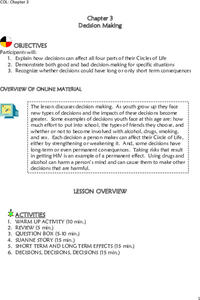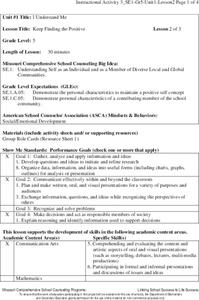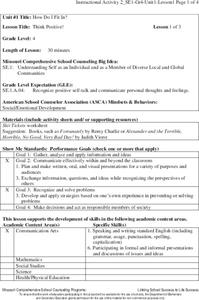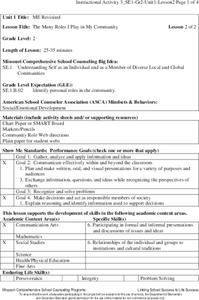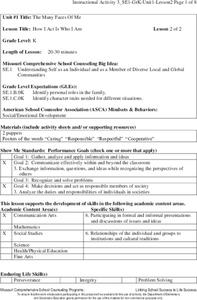Missouri Department of Elementary
Friendship Line Dancing
Develop social awareness with a activity that challenges scholars to properly communicate with their peers. Standing in two lines, participants practice introducing themselves, asking how their partner is feeling, asks if they want to...
Missouri Department of Elementary
Express Yourself!
Encourage scholars to express themselves with help from an engaging song. Sung to the tune of "London Bridge is Falling Down," participants sing phrases that offer tips for dealing with emotions—sad, happy, worried, proud, mad, and...
Missouri Department of Elementary
Same and Different
A take on "If You're Happy and You Know It" opens a lesson about similarities and differences. Scholars speak in-depth on the unique characteristics that make up their classroom. The teacher or counselor records responses. Class members...
Missouri Department of Elementary
Acting Out Respect and Compromise
Puppets showcase the importance of being a good friend. Following a discussion about positive character traits, scholars create a paper-bag puppet and role-play scenarios with a peer.
Missouri Department of Elementary
Family Traditions
Honor family traditions with a lesson that examines the variety of winter celebrations. Class members discuss their family's traditions then complete a cut-and-paste practice page in which they match a picture to the name of a holiday....
Healthy Native Youth
Chapter 1: Circle of Life
Volition, or will-power, is the focus of a lesson that brings forth the Native symbol, the Circle of Life, to instill the importance of responsible decision-making. Scholars take part in six activities that empower them to reflect on...
Healthy Native Youth
Chapter 2: Learning About Adolescence
The Native American symbol, The Circle of Life, represents life's spiritual, physical, mental, and emotional well being. By way of deep discussion, and two games, the lesson uses the Circle of Life to explore the stages of...
Healthy Native Youth
Chapter 3: Decision Making
By way of group discussion, reading, and role-play a series of six activities encourage scholars to make responsible decisions. Following an online introduction, pupils review the concept of volition and answer questions. Middle...
Healthy Native Youth
Chapter 4: Learning About Disease
Communicable diseases are the focus of a lesson plan that primarily uses discussion, a hands-on activity, and a worksheet to drive their point home. Lotion and glitter create a strong visual for communicable diseases. A practice page...
Nemours KidsHealth
Puberty: Grades 6-8
Going through puberty isn't easy, or for the faint of heart. Prepare middle schoolers for the challenges of the changes with activities that ask them to assume the role of a reporter for the Human Body Olympics. Writers craft a news...
Missouri Department of Elementary
My Problem…Your Problem…Our Problem
Encourage sixth graders to take responsibility for their actions and become a problem solver. Pupils discuss new problems faced in sixth grade then identify ones that involve other people. A worksheet guides their practice in conflict...
Nemours KidsHealth
Healthy Relationships: Grades 6-8
Help middle schoolers develop healthy relationships with a series of activities that teaches them not only to recognize and protect themselves from unhealthy relationships, but also how to develop and maintain positive ones. In addition,...
Nemours KidsHealth
Puberty: Grades 3-5
With puberty comes lots of changes to one's body. Scholars explore those changes with two lessons that examine the role of the pituitary gland and hormones. In the first lesson, pupils take on the role of the pituitary gland, write a...
Equality and Human Rights Commission
Learning area 2: Challenging Stereotypes and Discrimination
Six powerful and eyeopening lessons provide scholars with activities designed to challenge stereotypes and discrimination. The unit provides reading material with which pupils read and discuss. Grand conversations lead to physically...
Nemours KidsHealth
Conflict Resolution: Grades 6-8
Conflicts happen, conflicts grow, it's how to handle them that middle schoolers need to know. Introduce tweens to a problem-solving approach for handling anger with a series of activities that has class members read articles, research...
Missouri Department of Elementary
Keep Finding the Positive
Group members take on roles to create a positive classroom community. Learners perform their role—leader, recorder, presenter, timekeeper, encourager, and collector—in preparation for a formal presentation of their positive thinking...
Missouri Department of Elementary
Are You Balanced?
Balance scales create a strong visual of how an individual prioritizes one's self alongside their commitments to the community, school, and home. Scholars complete a graphic organizer then discuss their findings with their peers. A...
Missouri Department of Elementary
Think Positive!
Following an attention-grabbing read-aloud, scholars brainstorm ways they can change negative thoughts into positive thoughts. Small groups plan and perform a skit that showcases one of the new ideas to uplift one's feelings....
Missouri Department of Elementary
What Color is Your Apple?
Build your classroom community with an activity that uses apples to examine oneself and their classmates. Participants draw four large apples on blank paper then exchange them within a small group. Group members write a character trait...
Missouri Department of Elementary
Goldilocks Revisited
After a read-aloud of the story Goldielocks and the Three Bears, scholars gather into small groups to answer a series of questions. Peers examine the idea of smart decisions and identify three feelings of characters alongside three...
Missouri Department of Elementary
The Many Roles I Play in My Community
Small groups brainstorm their roles in the community. Then, individually, complete a community roles web worksheet. Peers share their completed product and extend the conversation to include the feelings and character traits that go...
Missouri Department of Elementary
Character Clovers
Build a classroom community with a lesson plan that uses character clovers to examine scholars' roles. Following a whole-class discussion, participants list four roles they play and accompany it with the character traits that go along...
Missouri Department of Elementary
How I Act Is Who I Am
A lesson centers itself around the topic of family roles. A whole-class discussion uses puppets and posters to go in-depth into the following character traits; caring, responsibility, respect, and cooperation. The discussion closes with...
Missouri Department of Elementary
Happy, Sad, Scared and Mad: All Belong To Me
"What are feelings?" and "Why are feelings important to understand?" are the essential questions of a lesson that boosts self-awareness. Scholars discuss the four basic emotions—happy, sad, scared, and mad—in preparation...



